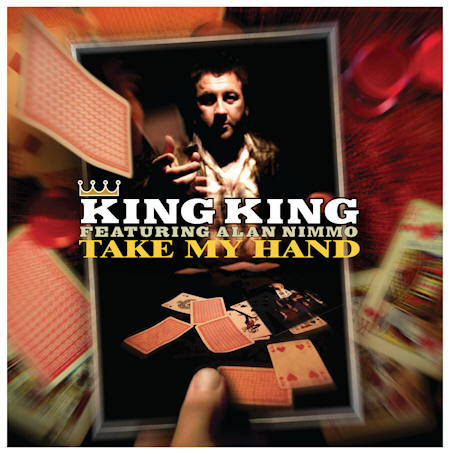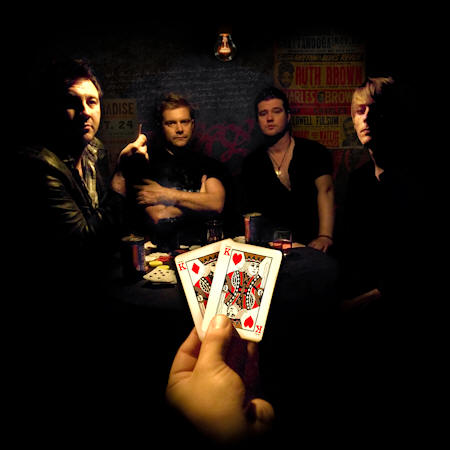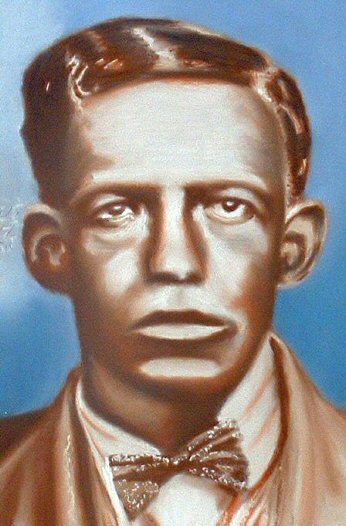
Painting © 2004 Loz
Arkle
Website
© Copyright 2000-2011 Alan White - All
Rights Reserved
Site optimised for Microsoft Internet Explorer
Early Blues Interview
|
|
|
ďSoftly softlyĒ is not a maxim that King King are familiar with. Since surging into life they have barely stopped for breath, and their electrifying sound and scorching live shows have generated more of a thunderous roar than a buzz.
Leading the charge is the aforementioned Alan, a frontman famed almost as much for his contagious energy as his dazzling guitar work. Widely known across the UK and Europe for his pivotal role with the award-winning Nimmo Brothers, Alanís full-blooded style, technical brilliance and impassioned vocals combine to hit all the right buttons and reach spots that many others can only aspire to.
Bringing up the rear we have Lindsay Coulson. Donít be fooled by the wry
smile Ė beneath his unruffled exterior lurks a powerhouse of punchy, fat
bass whoís musical career has seen him take to the stage with such well
regarded blues acts as Aynsley Lister and Philip Walker. He has also
been a regular in the Nimmo Brotherís lineup, and this history with Alan
has resulted in a dynamic musical chemistry which is evident in both
songwriting and performance.
I caught up with Alan Nimmo and Lindsay Coulson at the Skegness Rock and Blues Festival. Alan White: What are your first musical memories growing up in Glasgow? Alan Nimmo: My father was a singer in the local bands around Glasgow and he was always interested in what was popular and wanted at the time, stuff like Deep Purple, but my interest in blues came from my mother. She is a massive blues fan, still today, and when we were kids she had all these records by Peter Green, Eric Clapton, Derek and the Dominoes, BB King Ė she had it on the record player all the time. There was an old acoustic guitar lying around in the corner of a room and it had sat there for many many years, just as a coat hanger really, and then one day my brother and I got interested in guitar playing, at around the same time even though he is six years older than me. We started playing separately but I wanted to sound like what I listened to, I wanted to sound like Peter Green. I can remember being 2 or 3 years old and sat in the middle of the living room hearing my fatherís band so Iím used to noise and Iím deaf anyway now!
Alan Nimmo: I canít ever remember having any of those sort of ambitions when I was a kid, I canít remember saying I wanted to be a doctor or a musician or anything. I just wanted to run around and get up to mischief when I was a child and I didnít look to the future. I suppose I stumbled on the music and guitar playing and didnít really know how much it meant to me. I would always say that music grasps you, you know it takes you, you donít grasp music. It chooses you. I realise that before I knew it years had passed and Iím doing what I do. If somebody came and asked about my ambitions, Iím here doing it and living my dream. Alan White: What kind of material were you playing in the early days? Alan Nimmo: A lot of Peter Green and Eric Clapton. Iím a massive fan of Free, they are my favourite band even today and Paul Rodgers is my favourite singer. My brotherís my favourite singer as well of course. Paul Kossoff's guitar playing really stood out for me; the passion he had for playing and what he did when he played really got hold of me and I took a lot of early influence in my playing from Paul Kossoff. You can still hear it today, thereís little bits of it in there. My brother always says to me that when heís watching me he knows when Iím lost in the moment and ďYou donít know whatís going on around you, because you start playing like Paul Kossoff again. Thatís when I know youíre in your own little zone.Ē Alan White: I remember seeing Free at Mothers Club, Birmingham and I froze. Most amazing sound! Alan Nimmo: My mother saw them in Glasgow in 1968 alongside the Small Faces and Joe Cocker on a sort of caravan tour. Alan White: Am I right in saying that it was the British Blues movement and English blues musicians in the Ď60s that really first attracted you to the blues? Alan Nimmo: Yes, I guess so. The great 60s blues boom with the John Mayall thing when he started introducing all the great guitar players and, yes, Iíd say it was the British scene first and then I got more interested in the American stuff, even the Texas-style shuffle and the Chicago thing as well.
Alan Nimmo: We were just kids back then, I was only 17, itís probably one of the last times that we had a band. Four guys all pulling in the same direction, wanting the same things, taking the good with the bad and we were literally just four young lads from Glasgow who, well, I wouldnít say we didnít care, but we just had a brutal honesty about us and we just came in and we played. It wasnít about how it is nowadays when you are marketing a business and youíve got to look after it. We didnít have a clue about all that back then, we were just young lads who wanted to play in a band and we all loved...well we were often associated with the sound of Fleetwood Mac back then because it was two Les Pauls and thatís kind of what we did. Those times were great. With hindsight I suppose if we had marketed ourselves better and ran more like a business then who knows what would have happened. But I have no regrets for any of that because we had a ball. Iím still in touch with everyone who was involved in that band and weíre all great mates now; all doing different things. Alan White: After the Blackwater Blues Band you and Stevie became the Nimmo Brothers. You were with Matt Beable on bass and drummer Craig Blundell, were they in the band at the beginning? Alan Nimmo: No, when we first disbanded the Blackwater Blues Band because, well, the drummer with that band is my good pal Boyd Toner who plays with The Stumble. He was the original drummer and he moved down to England to get married. We still had players from Glasgow for a long time and Lyndsay Cookson was the regular bass player. For a long time our drummer was Dave Rayburn or Mark Barrett, both former players with The Hoax.
Alan Nimmo: The
Moving On album we recorded in Glasgow at the same place we recorded
the Blackwater Blues album and used a couple of local guys in Glasgow
that were playing with the band at the time. I actually really liked
that album. I always have trouble listening to albums Iíve recorded and
I always think, ďOh no, thatís
Alan White:
Your next album 'New Moon Over Memphis' was your first acoustic
album, featuring the beautiful John Hiatt song 'Feel Like Rain' -
always a 'showstopper' at live gigs - this must have a special
meaning for you.
Alan White: Who has influenced you the most in your music writing and playing? Alan Nimmo: I strive to get my own sound of course but my influences definitely draw from bands like Free. I love my blues music but I am a rock fan and the guitar players that I like in the rock scene come from blues-based playing, Angus Young from AC/DC. Another of my favourite bands was Thunder, Danny Bowes was heavily influenced by Paul Rodgers in his singing as well, you can hear it, and their type of song writing appealed to me as well. Blues to me is not 12 bars, itís just not at all and it never will be. Sometimes you get people who are purists and they turn their nose up at certain types of music and thatís a shame because thereís so much great music thatís got blues, because it's a feeling, it's got heart and soul. Bands like early Whitesnake, David Coverdales is one of my favourite singers as well. Thereís all sort of influences, Prince, Stevie Wonder, Thin Lizzy, one of my favourite all time bands. Alan White: Whatís your favourite guitar? Alan Nimmo: Although I do use my Stratocaster a lot my favourite guitar will always be my Les Paul that Iíve had since I was 15. Itíll die alongside me and Iíll probably be buried with it. Alan White: What does the Blues mean to you? Alan Nimmo: Blues to me is something that comes from inside. I love music, I'm a musician, guys like us suffer for our art! I donít need the violins for that but Blues is my life. I often say that I have a home and a life at home but Iím more aware and familiar with .... I still live in a bag at home, Iíve got a wardrobe sitting there that's empty. You can get used to travelling and as you get a bit older you do get a wanting to stay at home more and do normal things that normal people do. But I know itíd only take me five minutes of that kind of life and I know Iíd have to get back to this.
Alan Nimmo: One of my favourite blues bands is called The Red Devils who produced one album and then unfortunately the singer, Lester Butler, killed himself, choking on his own vomit Ė he was a bit of a party boy. Their album was called 'King King' but it was a famous blues club in Los Angeles that burned to the ground. So thatís where the name came from. We thought it was a nice name with a good ring to it and it made for a nice feature for our artwork. We even managed to get a pun in there with the title of the album, Take My Hand, I thought thereís cards in there, but...! Alan White: I remember being at what I think was King King's second gig of you first tour at Joyce & Bill's Barrow R&B Club on 30th January 2009, with Lindsay Coulson on bass, Dave Raeburn on drums and Dale Storr on keyboards. Since then you have gone from strength to strength, and I have a quote: "with an almost instant reputation which spread like wildfire through the blues scene..." Tell me a little about your tours and the band's journey so far. Alan Nimmo: You know, the last two years have just whizzed past, itís been so hectic. When youíre in this you donít often see the progression as clearly as other people because you're involved in it so much, but when you sit back and take stock of how much has happened over the last two years, how far weíve come, itís actually something to be really proud of. Weíve signed to Manhattan Records, weíve got a management deal from Alan Robinson, weíve played Glastonbury and those kind of festivals, we had a great time at Colne and Monahan Blues festivals and various European festivals and it just seems to be that itís like we havenít stopped for breath. It got to Christmas and we had a bit of time off but the momentum is still going. Iíve been just waking up in the mornings and thinking, ďWhereís my bag and where am I going today? Oh, nowhere, I can relax!Ē Itís been an amazing journey, very hectic, but thatís what we wanted and thatís how we want it to continue.
Alan White: Iím sure it will! At Maryport in 2009 you followed Jethro Tull on stage. Unfortunately thatís the one Maryport Festival Iíve missed (close call with daughterís graduation!) and Iím told it was to rapturous applause. How was that experience of following Jethro Tull? Alan Nimmo: Iíve got such admiration for any band that stands on stage and does their thing, itís like a brotherhood, a family, weíre all pulling in the same direction and weíre doing this for the same reasons. And Jethro Tull are legendary so it was great, absolutely fantastic, to go on stage after them. I have to be brutally honest, we are not afraid of anyone. Itís not a competition for us, thatís for other people to do, weíre just musicians, a band playing. I would happily go on stage after Eric Clapton because it wouldnít be intimidating, it would be inspirational, I would watch that and want to play. It makes me want to pick my guitar up, it doesnít make me shy away and think, ďOh, Iím never going to play like thatĒ. I just think, ďYeah, Iíll do thatĒ. Alan White: King King recorded a session for Paul Jones's BBC2 Rhythm & Blues Show at Maida Vale, tell me a little about the experience. Alan Nimmo: Iíve done it once before with the Nimmo Brothers and the studio was at Pebble Mill, Birmingham, and that was a great experience but to get to go to Maida Vale was, just, well, youíre looking at a plaque on the wall that says ďBing Crosby recorded his last session hereĒ and youíre standing in a room where every one of my influences have stood at some point and recorded or played there. That was an amazing experience. The reception that we got from that with songs getting played was amazing. We had an email from a chap, and to me this sums up the answer when people ask me what I determine as success and to me this was it: this chap emailed me to say that him and his brother had been looking after their poorly father and they were driving home and he turned on the radio and heard the Paul Jones show and he played the version of Old Love that we do and he said they had to pull the car over, and just sit there. His brother was in tears and they just sat there, they loved it that much. And that, to me, is by the most complimentary thing that anybody could do for me. Iíll take that over any money any day. That's just fine.
Alan Nimmo: Ah, yes, it's been a long time in the making unfortunately. Because the bandís been so busy weíve been constantly on the road and finding time to get back in the studio and finish it off has been a terrible nightmare. It ends up with having to find availability of the studio (itís a really popular studio with bands like Arctic Monkeys, Saxon and all sorts of people in there recording), so you've got to try and find a slot that fits in with when you are off the road, then find the right time for the guys in the band who are all busy with other stuff plus trying to get off the road, was really difficult. As you know Craig Blundell plays with us quite often along with Wayne Proctor, our two regular drummers for King King. Craig's an international demonstrator for Ronald V-drums and he's all over the world all the time; and Wayne's a very good producer of records nowadays and he's doing a lot of work for younger bands, so he's busy as well. Eventually we managed to get it done and it was a big thing. But having said that, Iím very pleased with the outcome, really proud of it and very proud of the lads for the job they did. I couldnít have asked for better. Alan White: How do you see the future of blues music? Alan Nimmo: Well, the blues scene tends to come and go in waves, then it comes back, then it dies a little bit but I think there has to be a long, long future for blues music because itís one of the last remaining genres of music thatís real and honest. Thereís more and more young kids coming up and learning blues and I donít think it has the same stigma attached to it that it used to because of the introduction of a lot of young players. And also in terms of King King are doing with our songwriting, we are opening blues music and saying, ďLook, it doesnít have to be 12 bar. Itís great, beautiful, when itís done properly, one of the best styles of music I still get excited about, but thereís more to blues than just thatĒ. Alan White: Thanks very much Alan, I really appreciate that.
Alan Nimmo: You're
very welcome.
Check out photos of King King at the Skegness Rock & Blues Festival
Return to
Blues Interviews List |








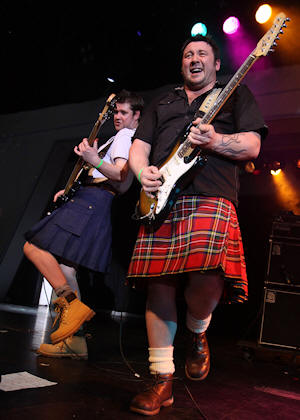

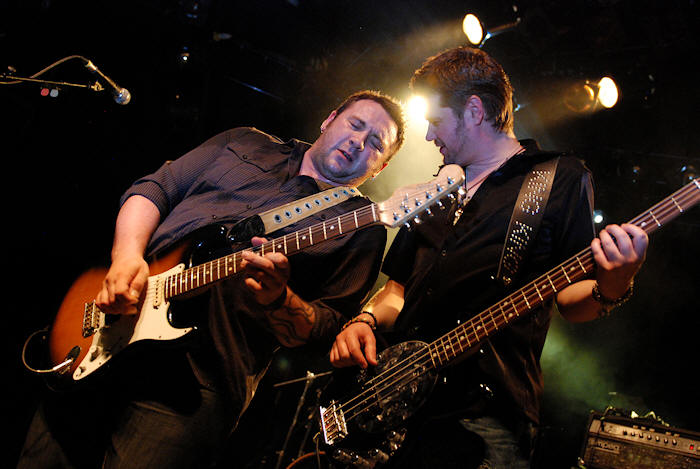
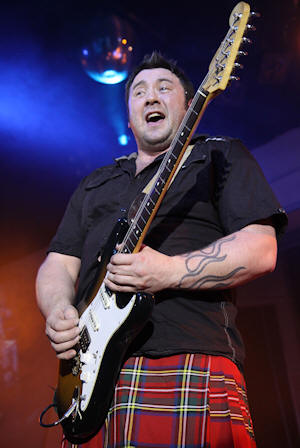 Alan White:
Did you always want to become a musician?
Alan White:
Did you always want to become a musician?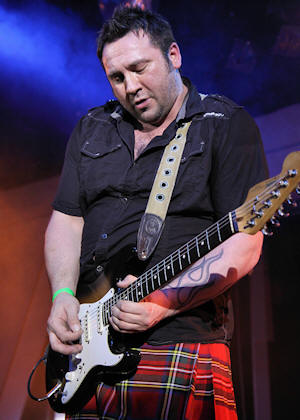 Alan White:
Together with Stevie, your first band was the Blackwater Blues Band Ė
tell me about those times.
Alan White:
Together with Stevie, your first band was the Blackwater Blues Band Ė
tell me about those times.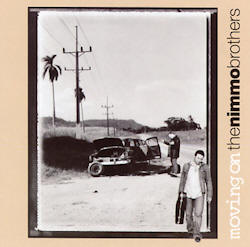 Alan White:
The first Nimmo Brothers album 'Moving On'
demonstrated your
versatility, but it was your next album 'Coming Your Way' (your
first with Armadillo Records) that was most influential took you to the
forefront of the British and European blues scenes, tell me about those
times.
Alan White:
The first Nimmo Brothers album 'Moving On'
demonstrated your
versatility, but it was your next album 'Coming Your Way' (your
first with Armadillo Records) that was most influential took you to the
forefront of the British and European blues scenes, tell me about those
times. 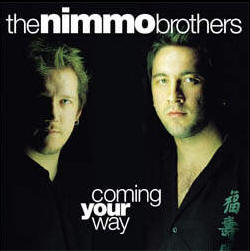
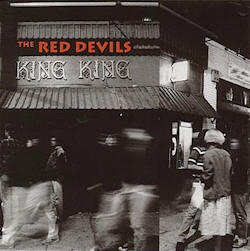 Alan
White: King King? Where does the name came from?
Alan
White: King King? Where does the name came from?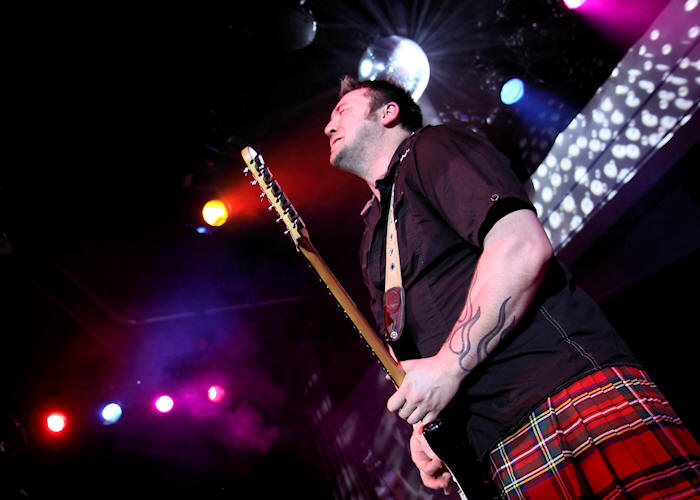
 Alan
White: Itís been a long time in the making, tell me about
Alan
White: Itís been a long time in the making, tell me about
